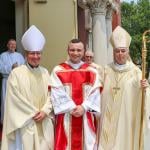An honest Protestant reader asks concerning Peter Sean Bradley’s recent argument with a group of people who were insisting that he worships Mary:
I follow the argument but isn’t the real question whether or not prayer is a form of worship? If prayer is worship, then isn’t praying to Mary a form of idolatry? This is an honest question and one that cannot be avoided – not “fear” from a Protestant who doesn’t want to hear the truth. Bowing a knee to someone in this life may not be worship but petitioning to someone who is not presently in the body certainly seems to fit the definition of prayer (i.e. worship). Do Catholics not consider prayer a form of worship? Or is it that you don’t “pray” to Mary?
Your major premise is defective. Prayer is not worship. Prayer is archaic English for speech or request (as in, “I pray you, do thou give me another ale, sirrah, and I shall reckon it an act of kindness withal”). Religious traditions tend to preserve such archaisms, which is why millions of Christians around the world still say, “Our Father who art in heaven”.
The fact that somebody is or is not present in the body has absolutely nothing to do with whether or not speaking to them and asking them for something is worship. To worship, biblically speaking, involves not mere request, but *sacrifice* of the very self. “Offer your bodies a living sacrifice, which is your spiritual worship” (Romans 12). This understanding of worship is rooted in the Christian vision of the ultimate act of worship: that offered by Christ on the cross (“Take, eat: this is my *body*”). To worship, biblically speaking, is to join Christ in that offering of the body to God. To commit idolatry is to offer oneself to something else as the highest good.
Now, we can and do offer our bodies to and for creatures as well, most notably when we offer our bodies to our spouses in marriage. Soldiers offer “the last full measure of devotion” to creatures called “nations” (and are rightly honored for it). Parents offer their bodies and lives for their children and are likewise rightly honored for it. So merely offering yourself to another is not necessarily idolatry. The key is to offer in such a way as to place the creature as the highest good, above even God. If you offer your body in sacrifice for a creature as a *subordinate* good, out of reverence for God, you are, so far from committing idolatry, actually honoring God.
But merely asking of or speaking to the blessed dead in Christ is no more worship than if I spoke to or asked something of you. The strange superstition that says I can’t ask you to pray for me or exercise a charism you might possess on my behalf, merely because of the accident of your death is a teaching found nowhere in Scripture. Similarly, the notion that the dead are cut off from us or somehow magically stop loving their fellow Christians once they die is found nowhere in Scripture and, in fact, contradicts the rather obvious witness of Moses on the Mount of Transfiguration and Paul’s testimony that “neither life nor death” will sever us from the love of God. It also contradicts John’ witness that the blessed dead will see him as he is and be like him.
So, yeah: Catholics pray to Mary (and all the saints). But we don’t worship them (in the sense of according them the honor due to God) because they aren’t God. If you are confused about the difference between prayer to the saints (which the Church encourages) and necromancy (which the Church forbids), I would suggest you read this. Bottom line, I’ll tell you the difference between prayer to the saints and necromancy if you will tell me the difference between miracles and magic or between prophecy and divination.
One note of caution: older English texts will sometimes speak of the “worship of the saints”. That’s because “worship”, like “gay” is a word that has changed in meaning. Older wedding vows include the promise “With my body I thee worship” which the spouses say to one another. Likewise, judges in England are still called “your Worship”. This does not mean that English speakers used to believe Judges and spouses were equal to God. It means that “worship” used to mean “honor”. These days, “worship” is a word that is generally restricted to the sort of honor due to God. Consequently, the normal term in modern English that is used to describe the honor given to Mary or the saints is “veneration”.
But, bottom line: prayer is not equal to worship (technically called “latria”), which is the honor due to God alone. Latria can certainly be expressed by prayer, just as it can be expressed by kneeling. But not every person who kneels or prays is offering latria.















